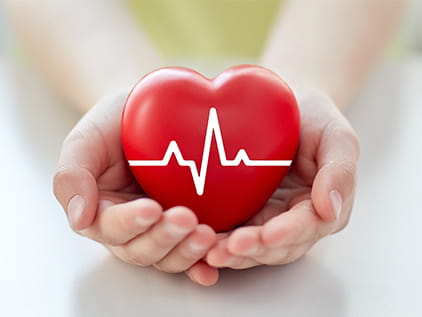CardioScore

CardioScore is a diagnostic test that measures the amount of hard plaque in your coronary arteries. It is used to help you understand your risk for developing coronary artery disease. The coronary arteries are blood vessels that supply your heart with oxygen-rich blood. Strong and continuous blood flow to the heart is essential. If blood flow is interrupted or constricted, a heart attack can occur. Coronary artery disease is the leading cause of death for men and women in the United States.
What is CardioScore?
CardioScore is a noninvasive computed tomography (CT) scan of the heart. The calcium score test takes just a few minutes and measures the amount of calcified plaque in your coronary arteries. Plaque is a waxy substance that can accumulate over many years. Over time, the plaque can limit or block blood flow to the heart. It can also rupture and result in a blood clot, which may cause additional narrowing or a heart attack.
Heart disease is a largely preventable condition. The sooner plaque is located, the sooner action can be taken to halt progression and strengthen the heart. Your physician can use the calcium score test results to determine if you need further cardiac testing, medication or lifestyle changes to reduce the risk of a heart attack or other heart problems.
Who can have CardioScore?
Your healthcare provider may order a coronary artery calcium score screening to help you better understand your risk of heart disease or to determine a treatment plan. People who are age 40 and older who have the following risk factors are good candidates for CardioScore:
- High cholesterol
- High blood pressure
- Currently smoking or a history of smoking
- Diabetes
CardioScore may not be helpful for people who:
- Are under the age of 40
- Have no family history of heart disease
- Have already been diagnosed with heart disease
What conditions can CardioScore diagnose?
Your CardioScore results can determine if you are at risk for heart disease and if you are at risk for heart attack. Your score can range from 0 to greater than 1,000. The physician or advanced practice provider will assess your score and other risk factors to assist in developing an individualized and optimal treatment plan.

Take the heart health quiz
How healthy is your heart? Although some heart conditions produce symptoms, others don't. Even those with no genetic history of heart disease can develop a heart condition.
Take our online heart health assessment to learn your risk.
Where to get CardioScore?
Noninvasive CT scans of the heart are available at the health system in Kansas City, Great Bend Campus, Olathe Medical Pavilion C and Paola Hospital. The scans may have slightly different names, but all measure the calcium buildup in your coronary arteries.
Benefits and risks of CardioScore
Many people learn they have heart disease after they have had a heart attack. The coronary artery calcium score can help identify if you have heart disease before it gets worse. Once you know your risk, your physician or advanced practice provider will help you make lifestyle changes that will include:
- Following a heart-healthy eating plan
- Maintaining a healthy weight
- Regular exercise
- Quitting smoking
Your doctor or advanced practice provider may also recommend medication for blood pressure or cholesterol to assist you in reducing your risk for heart attack. If you are concerned about the risks of the test, talk to your physician. They can recommend other options to determine your chance for developing heart disease.
How is CardioScore performed?
The calcium score test takes just a few minutes, but the overall process can take around 1 hour. On the day of screening, you should:
- Wear loose clothing
- Wear a bra without metal clasps or wires
- Avoid wearing jewelry on the neck or near the chest (rings, watches and pacemakers are acceptable)
During the screening, you will be asked to lie back on a platform that slides into a CT scanner and place your arms above your head. During the scan:
- You will need to stay still.
- You will be asked to hold your breath for short periods of time.
- Electrodes will be placed on your chest to record your heartbeat.
If coronary calcification is found on your scan, recommendations will be made based on your score.
Why choose us for CardioScore?
The University of Kansas Health System provides advanced heart care for people in Kansas City living with heart disease and other heart conditions. From the latest minimally invasive treatments to complex heart surgery, our cardiology specialists excel in all areas of heart care. Here, you can rest assured knowing you have access to the most modern, innovative services available from an expert team committed to your health and recovery.




